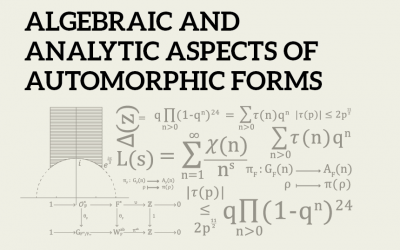The theory of automorphic forms is one of the frontier areas in mathematics, which links diverse areas such as representation theory of real and p-adic groups, theory of L-functions, and modular forms.
The algebraic and analytic aspects of the theory of automorphic forms are at the basis of much of modern number theory. The algebraic theory of automorphic forms broadly comprises of the study of automorphic representations of adelic groups, their L-functions, and also the study of their local components. The theory of group representations for real, p-adic, and adelic groups, is an actively pursued area of research and plays a central role in modern number theory. In the analytic theory of automorphic forms, the study of L-functions is one of the most important topics, together with Fourier coefficients of modular forms.
The workshop will be from 25th of February to 1st of March, 2019, and the discussion meeting from 4th of March to 7th of March, 2019. The workshop will consist of the following 4 courses, each of 6 hours duration, with some extra time devoted to tutorials.
- Prof. Ulf Kuehn (University of Hamburg, Germany) : "Modular forms and multiple q-Zeta values".
Modular forms occur in many facets in even more different areas of mathematics. Beginning with classical aspects of these marvellous functions these lectures will introduce multiple Eisenstein series and their linkage to the theory of multiple zeta values and their q-analogues. - Prof. Ameya Pitale (University of Oklahoma, USA): “Siegel modular forms: Classical and adelic aspects”.
Pitale will discuss Siegel modular forms, both from the classical viewpoint of functions on Siegel upper half spaces as well as the modern viewpoint of automorphic representations of the symplectic group. - Prof. Vincent Sécherre (Université de Versailles, France): “ℓ-Modular representations of p-adic groups”. Sécherre will discuss the theory of smooth representations of p-adic groups with coefficients in an algebraically closed field of characteristic ℓ, where ℓ is different from 0 and p.
- Prof. Shunsuke Yamana (Kyoto University, Japan): “L-functions and theta correspondence for classical groups”. Yamana will discuss his paper Invent. Math. 196 (2014), no. 3, 651–732, beginning with an introduction to theta correspondence.
The discussion meeting will gather together several national and international speakers to get a sense of some of the current directions in this subject without making it overtly technical.
Eligibility criteria: Applicants should typically be a PhD student or a post-doc in related topic. Applicants should apply with a CV and a half-page write-up on why the program may interest them.
 icts
icts res
res in
in

